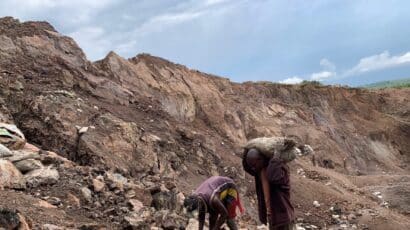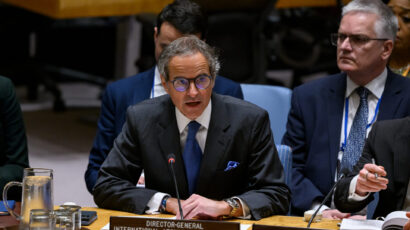Restricting the role of biosecurity
By Anna Zmorzynska, Iris Hunger | December 19, 2008
The list of issues that qualify as biosecurity concerns is expanding. Protecting against accidental disease outbreaks; the introduction of genetically modified crop plants, or foreign animal or plant diseases; food defense (formerly known as food safety); and controlling natural outbreaks of disease have all recently fallen under the biosecurity umbrella. This broadening scope has the potential to bring renewed attention to certain public health issues, but it also could tie public health too closely to national security agendas and may threaten the freedom of scientific research.
Traditionally, two different concepts are used to describe the associated risks of handling pathogens and developing countermeasures against them: biosafety and biosecurity. Biosafety is the older concept and was developed in parallel with recombinant DNA technology in the 1970s. For lab workers, biosafety means laboratory biosafety, which according to the World Health Organisation (WHO), “describes the containment principles, technologies and practices that are implemented to prevent the unintentional exposure to pathogens and toxins, or their accidental release.” In other words, biosafety prevents dangerous organisms from getting out of laboratories. For people concerned with consumer protection and the protection of the environment, biosafety means something a bit different, namely the protection of biodiversity and public health by controlling the importation, release, and use of genetically modified crops. The 2000 Cartagena Protocol on Biosafety forms the core of this understanding.
Biosecurity is a very recent concept that appeared in parallel with discussions about the growing bioterrorist threat. The term was unheard of before 1995, but its use exploded after the 2001 anthrax letter attacks. The term initially related to keeping dangerous materials out of terrorist hands, but its meaning has diversified since. The 2006 U.S. National Academies report “Globalization, Biosecurity, and the Future of the Life Sciences” defines biosecurity as “security against the inadvertent, inappropriate, or intentional malicious or malevolent use of potentially dangerous biological agents or biotechnology, including the development, production, stockpiling, or use of biological weapons, as well as natural outbreaks of newly emergent and epidemic diseases”; the WHO limits its definition to laboratory biosecurity and describes it as the “protection, control and accountability for valuable biological materials within laboratories in order to prevent their unauthorized access, loss, theft, misuse, diversion or intentional release”; and the government of New Zealand, for example, defines it as the “protection of the economy, environment and people’s health from pests and diseases.” Translation issues complicate the public understanding of the term further–for example, in Chinese, French, German, and Russian, the terms biosecurity and biosafety translate into the same word–as does the overlap between military and civilian biodefense efforts.
To clarify what biosecurity encompasses, we propose knocking a few subjects out of its purview. The concept of biosecurity should be limited to the prevention of the misuse of scientific activities for terrorist aims, in particular to keeping dangerous agents out of the wrong hands. Repositioning the term in this way would mostly require instituting the WHO definition of laboratory biosecurity. For managing other biorisks, such as research involving dangerous pathogens or human, animal, or plant epidemics, well-established countermeasures exist in the form of biosafety mechanisms, public health systems, and animal and plant health structures.
Why is it so important to limit the concept of biosecurity? What’s wrong with improving public health or animal and plant health in the name of biosecurity? Well, putting the “security” label on an activity risks making it less transparent and therefore less accountable to public oversight. Restricting the flow of life science research in this way would impede the scientific community’s discussions of experiments in question, leading to less efficient peer review, less “good science,” and less collaboration.
By limiting discussion within the scientific community on the impact of research, the necessary safety and security measures, and possible countermeasures, it could make the scientific process less safe and less secure. Moreover, restricting the flow of scientific information would be to the detriment of public health, especially in countries that are not yet able to develop such knowledge themselves, and might raise suspicions that research is directed toward bioweapons development.
“Securitizing” health and life science activities also carries the danger of redirecting funding from everyday health threats toward diseases that introduce security concerns. For example, a 2005 Sunshine Project study found that U.S. funding for research on bacterial agents of security concern (such as anthrax, glanders, melioidosis, brucella, and plague) increased approximately 25 fold between 1999 and 2004, while funding for research on HIV and tuberculosis fell by 20 percent during the same period. Research on hepatitis and malaria was cut even more. In addition, a recent WHO report criticized how health systems and health development agendas increasingly focus on individual diseases and specialized crises.
As an alternative, the report called for reorienting health policies toward prevention and health promotion and improving primary health care. Such a reorientation would improve global public health, which will ultimately limit the impact of disease outbreaks, be they natural, accidental, or deliberate. Limiting biosecurity to its original aim of preventing deliberate outbreaks of disease would further help to safeguard transparency and trust in the life sciences and leave public health funding and expertise in its rightful place–within the civilian medical research establishment–without undermining efforts to protect against the bioterrorist threat.
Together, we make the world safer.
The Bulletin elevates expert voices above the noise. But as an independent nonprofit organization, our operations depend on the support of readers like you. Help us continue to deliver quality journalism that holds leaders accountable. Your support of our work at any level is important. In return, we promise our coverage will be understandable, influential, vigilant, solution-oriented, and fair-minded. Together we can make a difference.
Topics: Biosecurity, Opinion















